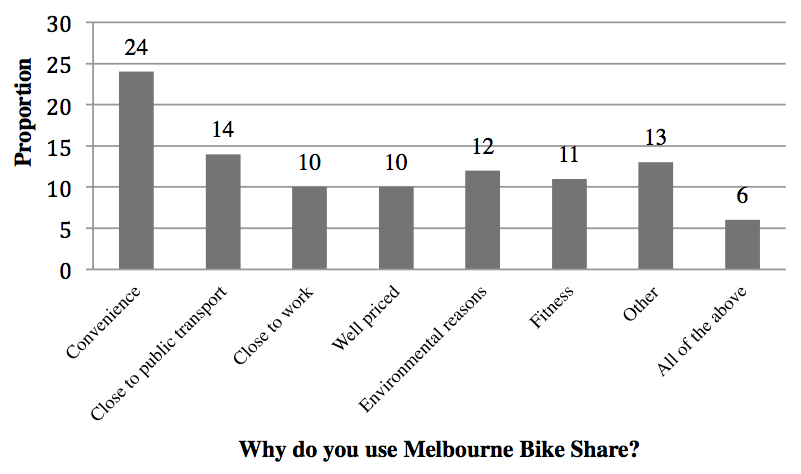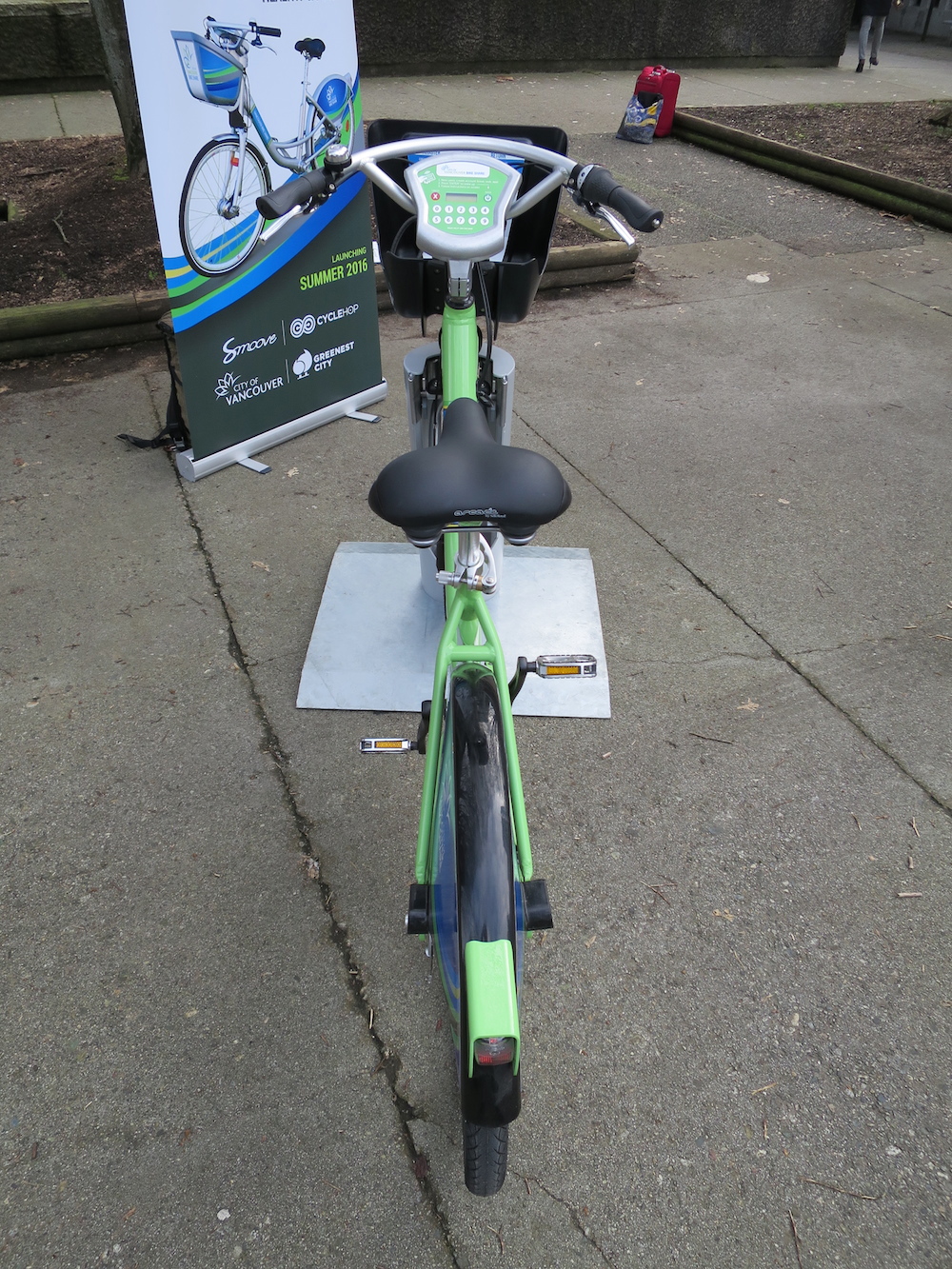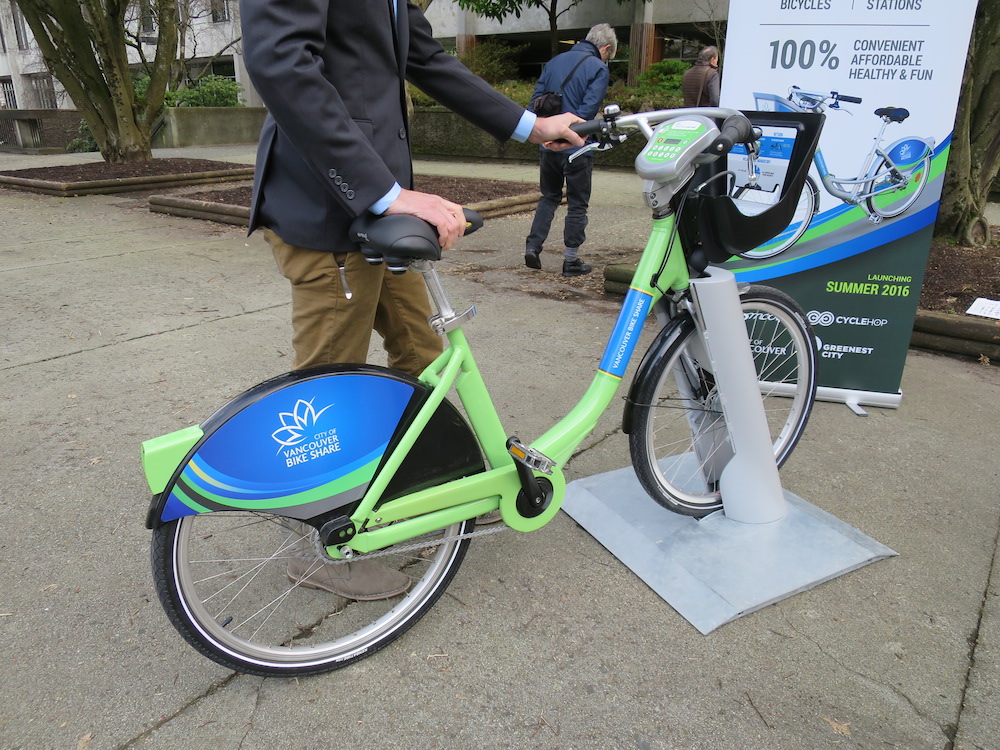
As part of the city’s new bike share system, a thousand bikes will be scattered around Vancouver’s metropolitan core area beginning in mid-June, just in time for summer when the weather becomes more optimal for cycling.
The municipal government announced on Tuesday that its bike share program is finally moving forward after years of delays from issues with the contractor’s financing and their challenges with meeting the provincial government’s mandatory helmet law.
Last summer, the City announced it was abandoning Motivate, previously known as Alta Bicycle Share, after the company’s bicycle infrastructure supplier Bixi filed for bankruptcy, simultaneously triggering a second procurement process for a new bike share operator.
Since then, Ottawa-based CycleHop has been selected to operate a bike share service in the city for a period of five years, with the potential for a contract extension to 20 years. A financial contribution of $5 million will be provided to the company for the first five years to assist with initial start-up costs of the operation.
“We want to help emerging industries and models start-up,” Jerry Dobrovolny, General Manager of Engineering for the City of Vancouver, told media during a press conference on Thursday at City Hall. “We did the same thing with car share, we did a number of things to encourage car share and we’re now the most successful car share city in the world.”
“At the time that car share companies wanted to start out in Vancouver, we worked with them to see what they need to get over the initial hump to be successful.”
There will be 1,000 bikes when the system launches and it will grow to 1,500 bikes across 150 bike stations by the mid-summer. The bike share coverage area covers the entire downtown peninsula and the Central Broadway corridor, framed by Arbutus Street to the west, Main Street to the east, and West 16th Avenue to the south.
If the system’s first phase is successful, it could be further expanded west to Macdonald Street and east to Commercial Drive.
But the municipal government stands to lose up to $800,000 in parking revenue from the reallocation of streetside parking spaces for many of the bike stations. The City says CycleHop will cover as much as half of the City’s lost revenues, for up to the first $400,000 in lost metered revenue.
“Our goal is to locate as many bike stations as we can on private property or out of the street right of way,” said Dobrovolny. “We have lots of competition for other uses for our parking stalls for parklets, food carts, parking zones, commercial loading zones, and taxi zones.”
There will also be an effort to avoid placing bike stations next to bike rental shops to reduce the level of competition. Planners say the target markets for both services are different, with bike share geared for short one-way trips and bike rentals for longer trips – with more specific bikes to choose from, such as trailers with child seats and tandem bicycles.
The precise price structure to ride bike share has not been finalized at this time, but Dobrovolny also says that bike share prices will not compete with bike rental shops. Riders will have the options of getting a day pass for single-use trips or a monthly pass.

Image: Kenneth Chan / Vancity Buzz
All bikes in the system will be supplied by Smoove, a French company that designs and manufactures bicycles for bike sharing. Proponents claim it will be the largest ‘smart-bike’ system in North America due to the CycleHop’s decision to use a fleet of so-called smart bikes, which are bicycles that integrate the payment interface and locking technology into the bike.
Cyclists will use the bike share system by tapping smart cards onto the bike handle’s RFID card readers and keypads. And as the system uses RFID technology, there is a possibility that bike share could be integrated with TransLink’s Compass Card down the road. In other cities, particularly Hong Kong, public transit smart cards can also be used for a multitude of services and businesses, including fast food restaurants, convenience stores, supermarkets, bakeries, movie theatres, schools, streetside metered parking, car parks, city recreational services, vending machines and even photocopiers.
“One of the major considerations that TransLink had when they launched the Compass Card was that that technology was adaptable and available to others, so that others could piggyback accounts onto their Compass Card,” said Dobrovolny. So technically, it’s feasible, and those are part of future discussions to see how we can combine technologies to reach a greater synergy.”
As another major feature of the smart bikes, each bike will be equipped with a basket that holds a helmet, replacing the previous plan to store reusable helmets inside vending machines at each bike share
The company’s smart technology and helmet-in-basket design significantly reduces capital and operational costs given the system’s ability to allow for smaller bike stations and the elimination of any need for costly helmet vending machines and return receptacles, as previously proposed by Motivate.
Instead, each bike will be equipped with a basket that holds a helmet that will contain liners for people who will want to use it for hygiene purposes. The helmets, purposely designed by Bell Helmets for Vancouver’s bike share system, will be free for bike share users and maintenance crews will service the helmets on a daily basis.
To prevent theft, a basket cover is in development and there will be sponsored graphics on the helmet. Additionally, a retractable cable lock for securing the bike when it is away from the bike stations during stopovers can be used to secure the helmet.

Image: Kenneth Chan / Vancity Buzz
“The helmet is specifically built for bike share,” said Josh Squire, the CEO of CycleHop. “It can withstand weather, be dropped, picked up… it’s very easy to clean. It’s actually going to be manufactured in Canada as well.”
“We’re going to offer helmets for free for every bike, but we’re also going to encourage people to buy their own bikes. For people who don’t have helmets, there will be helmets in the bicycle baskets.”
But will people want to wear reusable helmets from the baskets? In Melbourne, the bike share system has suffered due to the municipal government’s helmet law and the need to pay for a helmet from a vending machine at the bike stations.
Brisbane’s system is also hampered by a helmet law, although helmets are provided to users for free. However, helmet theft on the system is a major issue. In 2012, one year after the launch of bike share, 70 per cent of the helmets – amounting to 1,500 helmets – went missing from the circulation system.
Furthermore, survey data included in a 2012 study by Queensland University of Technology revealed that helmet laws were killing bike share use in Melbourne. When asked what deters them from using bike share, 36 per cent of respondents said it was ‘hard to find a helmet’ while 25 per cent ‘don’t want to wear a helmet’. It is also interesting to note that 16 per cent noted ‘bad weather’ as a factor.

Source: Alta Bike Share, 2011

Source: Alta Bike Share, 2011
Only a handful of jurisdictions around the world require a helmet for cycling, and those that do not have such a requirement – nearly 500 bike share cities – are generally successful with attracting riders. Bike share thrives on the spontaneous nature of unplanned rides, for short trips. In cities like Barcelona, London, Montreal, Paris, and New York, where bike share programs are booming, there is no need for a helmet.
Dobrovolny maintains that a unique solution to B.C.’s helmet law has been found, and the model could be replicated in other cities.
“We’re very confident that we’ve put together a good solution to the helmet requirement,” he said. “A limited number of cities have a helmet law, but many cities in North America want to add a helmet requirement. It’s accelerating the development of helmets.”
Moreover, the operator says there are other factors that will make bike share in Vancouver a success, mainly with the city’s built form and the rapid development of cycling infrastructure over much of the past decade.
“If you look at bike share, it’s a relatively new industry in North America,” said Squire. “It’s been around in Europe for longer. But one thing is for sure, it’s here to stay.”
“What makes bike share successful is that the city itself has density, cycling culture, infrastructure, and has weather good for cycling. Visitor market is another component and it needs to be embraced by the community… We predict success in Vancouver.”
Planners anticipate 80 per cent of trips will be made by locals and about 20 per cent will be from tourists seeing the sights.

Image: Kenneth Chan / Vancity Buzz

Image: Kenneth Chan / Vancity Buzz

Image: Kenneth Chan / Vancity Buzz


